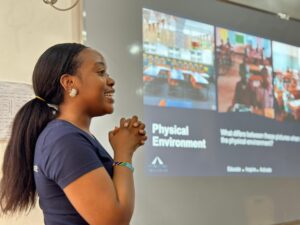Transforming Social Mobility in Nigeria
The Role of Transcend Education
In 2024, Nigeria remains one of the most challenging environments for social mobility. With 1 in 5 of the world’s out-of-school children residing here, approximately 10.5 million Nigerian children are deprived of formal education despite the 1999 Universal Basic Education (UBE) Act that promises free primary education (Iwundu & Inko-Tariah, 2015; UNICEF, 2024). Yet, even for those enrolled, social mobility remains elusive due to structural issues in the educational system, high unemployment rates among graduates, and a prevailing lack of skills tailored to the job market.
What is Social Mobility?
Social Mobility is the movement of an individual from one social position to another (Oyindo & Duru, 2019). Social Mobility cannot be studied in isolation; it is largely impacted by social, political, and environmental factors such as employment, power, influence, and wealth (ibid). Within Nigeria, such overarching factors continue to contribute to factors inhibiting Social Mobility for the youth population. Let’s continue to explore below.

Barriers to Social Mobility in Nigeria
A multitude of socio-economic factors hinder upward mobility, including nepotism, gender, war/conflict, ethnic and religious biases, economic instability, and insufficient employment opportunities for graduates (Jonah, 2016). Additionally, over 50% of children in a recent study showed zero mobility from the educational attainment levels of their parents, which underscores the importance of interventions aimed at breaking generational cycles of poverty (Suarez–Arbesú et al., 2024). Adolescence introduces further challenges, as peer influence can exacerbate behaviours such as low self-esteem, risk-taking, and substance use, all of which negatively impact educational achievement and future aspirations (Oni, 2010).
The ‘Japa’ Syndrome and the Crisis of Graduate Unemployment
With 22% of university graduates unemployed and many lacking necessary job skills, Nigeria faces a significant talent drain known locally as the ‘Japa’ syndrome—a term derived from Yoruba meaning “to break loose or run as quickly as possible” (Shuaib, 2023). From the perspective of a Nigerian youth, Peter Dingba, ‘Japa’ also means that “Nigerians want to export their contents, gifts, skills and products, including themselves” (Okunade and Awosui, 2023). Each year, around 50,000 Nigerians migrate to Western countries in search of better opportunities. This outflow reflects the lack of social mobility and limited access to economic advancement, particularly for those from disadvantaged backgrounds.
How Transcend Education is Making an Impact?
Despite these challenges, Transcend Education has taken bold steps to address these systemic issues. Through initiatives like the 500 Teachers Project, Transcend has provided high-quality, UK-standard training for over 350 teachers in low-income areas in Nigeria, impacting over 10,000 children indirectly. Schools partnering with us benefit from a minimum of one full year of support as a Community Connect School, allowing us to work closely with them to implement lasting improvements in teaching quality and educational outcomes.
Transcend has so far delivered teacher training, over 90% of teachers were ‘very likely’ to recommend this workshop to other schools/colleagues. By focusing on curriculum development, life skills programs, career-focused workshops, and management support, Transcend Education is building an ecosystem where students gain skills beyond academics to become empowered, employable citizens ready for Nigeria’s evolving workforce.

A Vision for Change
At Transcend Education, we believe that transformative change is possible. Our mission is to enhance the quality of education and build a framework where every child, irrespective of background, can achieve social mobility. Through continued collaboration with schools, educators, policymakers, and communities, we aim to dismantle the barriers to social mobility and create pathways for a generation of youth to lead Nigeria into a future of equitable opportunity and prosperity.
Stay tuned for Transcend Education’s upcoming full report on social mobility, a roadmap addressing challenges and providing actionable solutions to improve outcomes for disadvantaged communities in Nigeria.
For more, visit: www.educationtranscend.org

